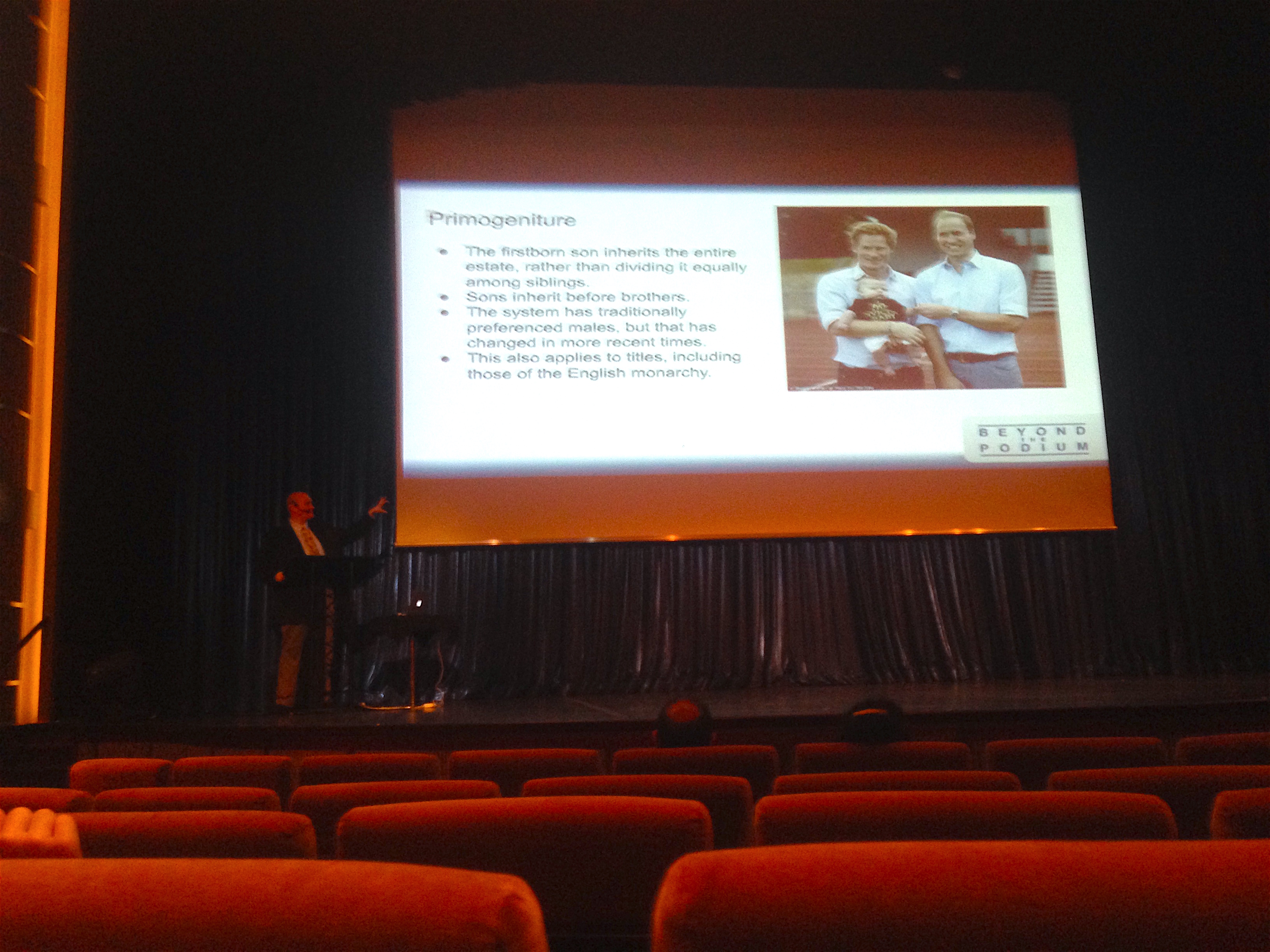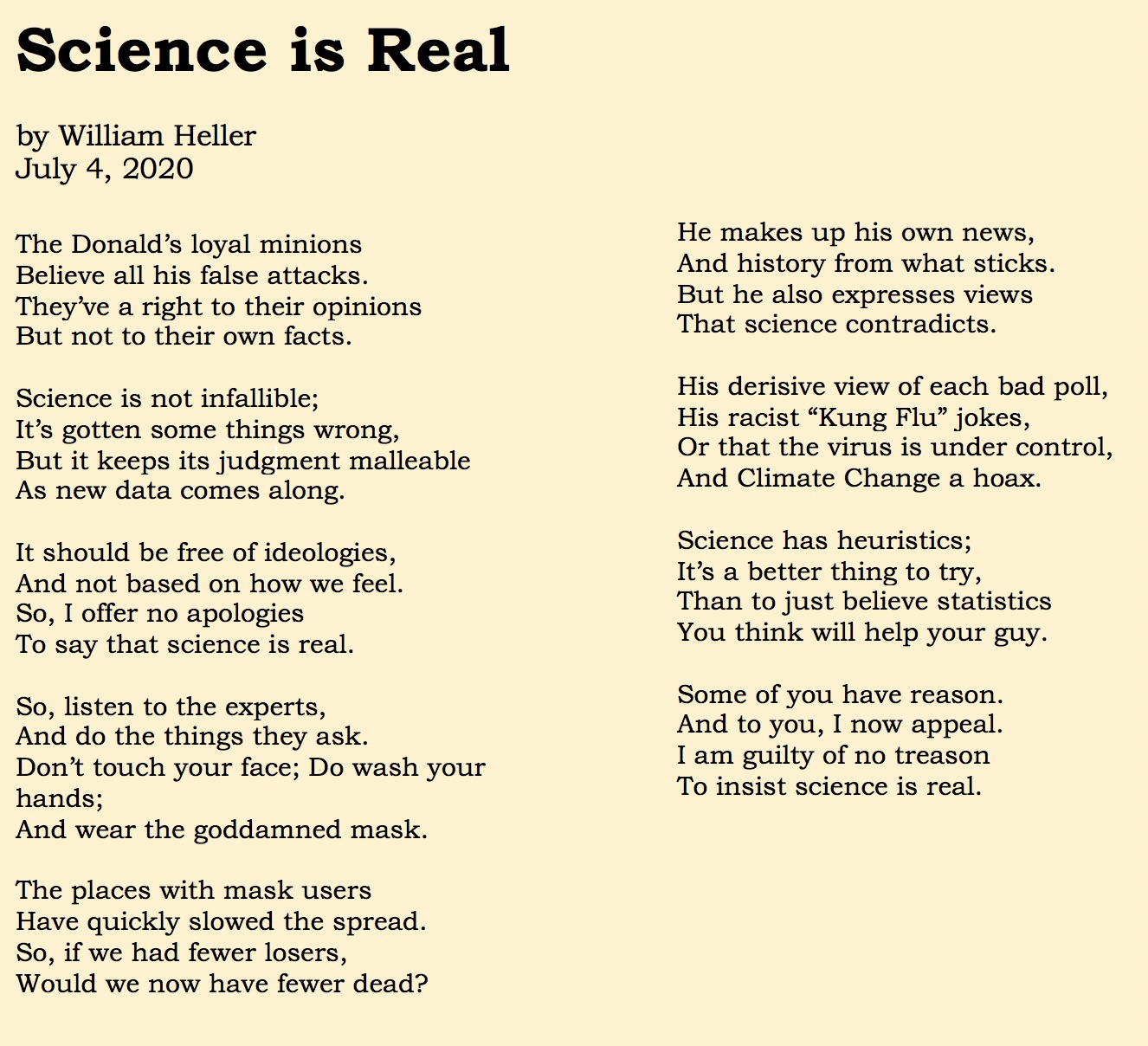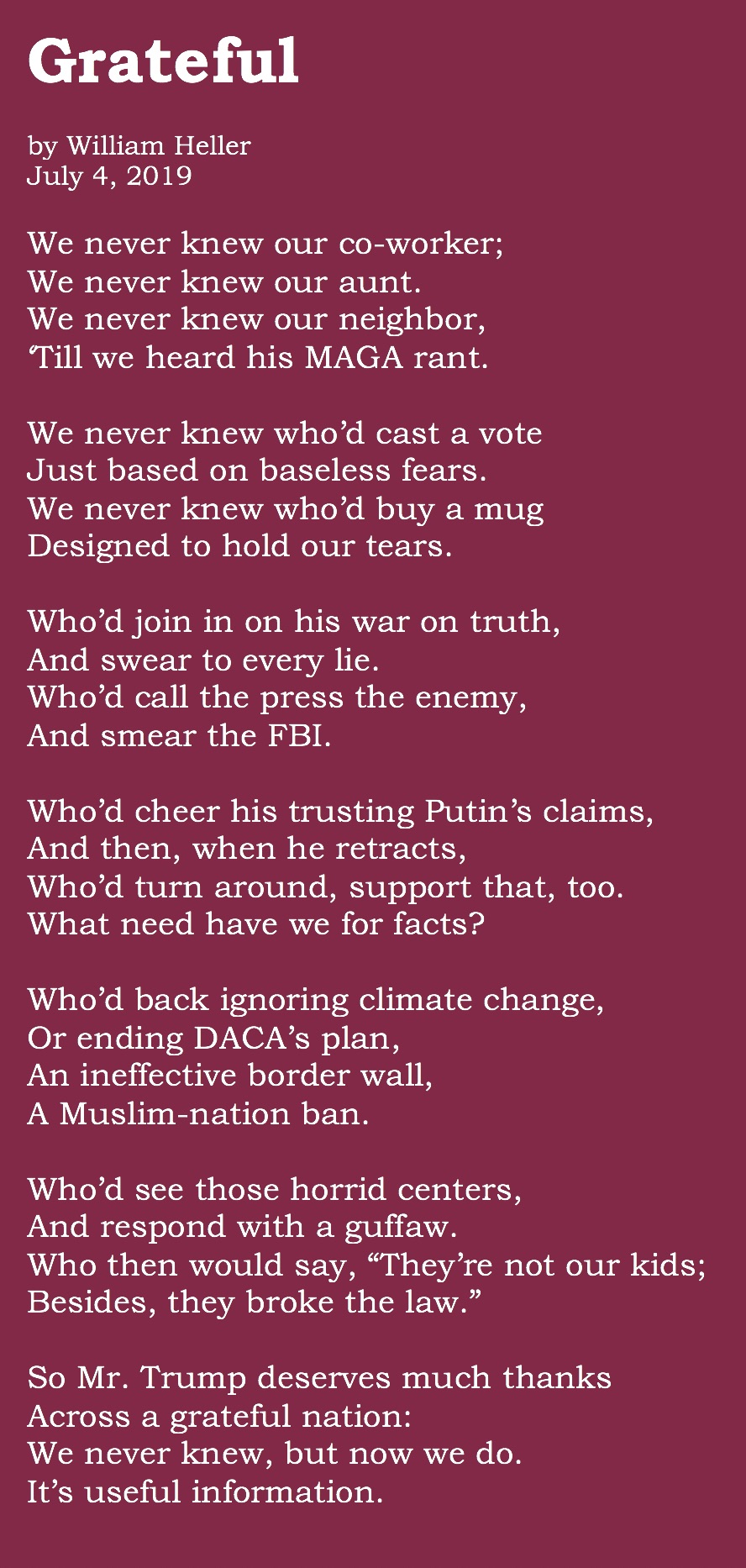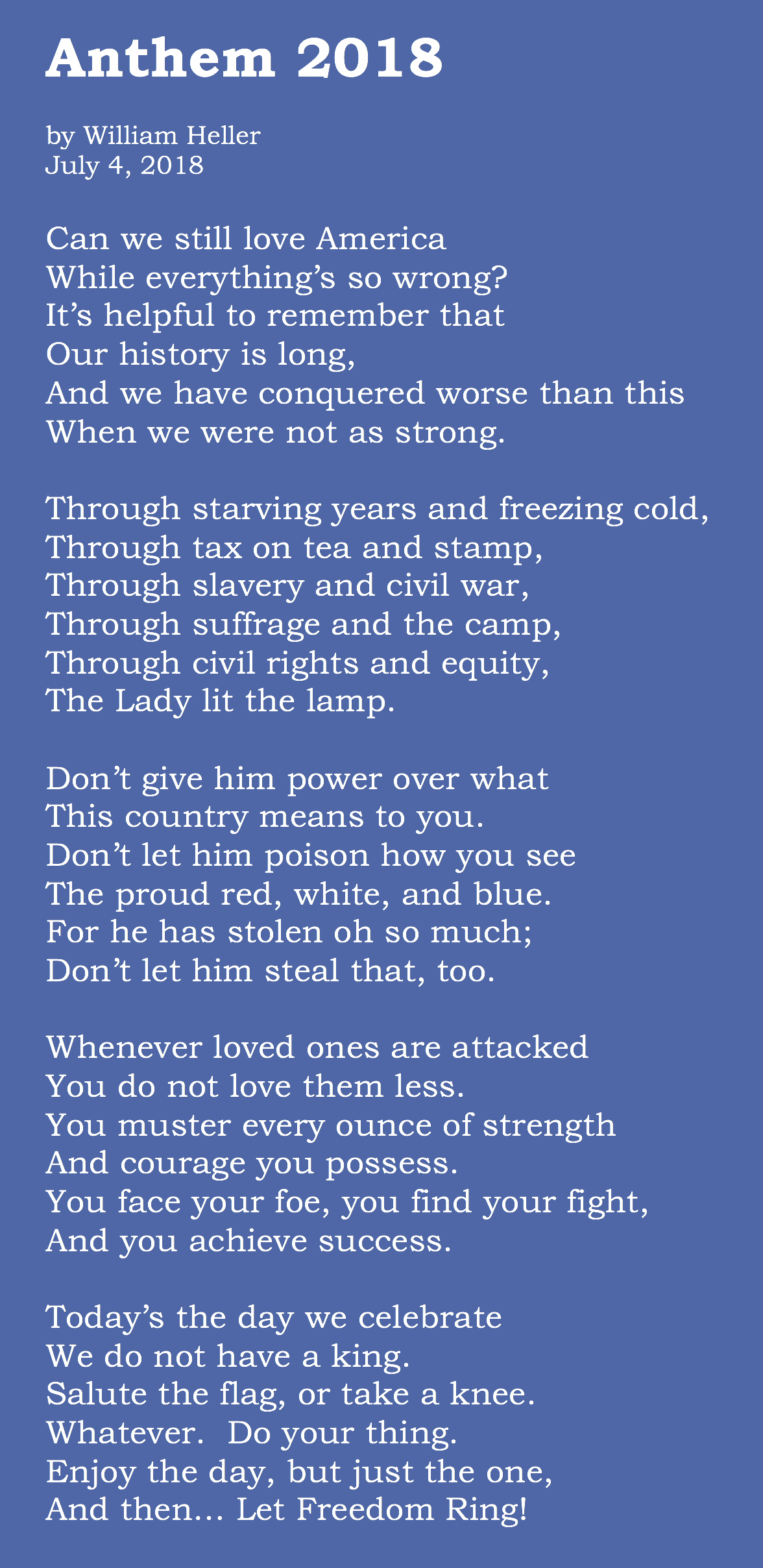Archive for the 'Poetry' Category
Grateful
Thursday, July 4th, 2019Anthem 2018
Wednesday, July 4th, 2018How NOT To Hate Shakespeare
Sunday, January 29th, 2017In this October 2016 TED talk, Shakespearean actor and educator Rob Crisell makes a passionate argument for Shakespeare, for teaching Shakespeare, and for teaching Shakespeare through performance. Whether you’re already with him on these three points or not, it’s well worth checking out:
Enjoy!
Welcome Celebrities!
Sunday, May 1st, 2016If you are one of the passengers from the Celebrity Shakespeare & Scandinavia Cruise, welcome! As promised, I am posting digital copies of the handouts from my talks, so if you missed one or didn’t get a handout, you can find everything here.
My first talk was on Hamlet. You can download the handout here. You can also read more of my posts about Hamlet at the category link here.
My second talk was on Shakespeare’s Use of Language. You can download the handout here. You can also read more of my posts about poetry at the category link here.
My third talk was on Shakespeare’s History. During the talk, I referred to a series of eight family trees that I compiled to go along with Shakespeare’s history plays. I used the first and the eighth of these as a handout for the talk. You can find all eight family trees here.
My talk today will be on Shakespeare’s Science. You can download the handout here. You can also read more of my posts following up on references from Shakespeare’s plays at the category link for the Shakespeare Follow-Up here.
Enjoy!

Teach Along with the Frozen Soundtrack
Monday, June 2nd, 2014So, you want to teach your students about literary devices, but they’re too preoccupied with the music from Disney’s Frozen? If so, this post is for you.
The Frozen soundtrack is actually full of literary, poetic, and rhetorical devices that you can point out for students, or have them find for you. Join me as I throw open the gates of Arendelle so that I may unlock its secrets and exploit its riches. (Did I say that out loud?)
“Frozen Heart”
This song introduces a number of motifs in the movie, including ice, snow, and the heart (frozen or otherwise). The lyrics use vibrant imagery throughout, and help establish the Nordic setting of the movie. Within the lyrics, anaphora is used as a device (“strike for love and strike for fear”), and there is a string of bold adjectives that form an asyndeton (Beautiful! Powerful! Dangerous! Cold!).
“Do You Want to Build a Snowman?”
It doesn’t have to be a snowman, because the snowman is a symbol for the bond between the sisters formed during childhood play. The song passes over long periods of time, forming an ellipsis. The lyrics make good use of alliteration, and there’s even an allusion to Joan of Arc. The lyrics say “Tick Tock,” which would be onomatopoeia, though in the movie, Anna clicks her tongue to simulate the sound.
“For the First Time in Forever”
The title is a great example of hyperbole, and the song foreshadows later events in that it explains why Anna is so quick to want to marry Hans. “Stuff some chocolate in my face” is metonymy. There is an intertextual moment when Anna passes Rapunzel from Disney’s Tangled. There is also a juxtaposition at the end when she sings that nothing’s in her way before running smack into a horse.
“Love Is an Open Door”
The title is a great example of a metaphor. “Can I just say something crazy?” is actually a rhetorical question. The lyrics make a lot of use of repetition, both with Anna and Hans repeating each other and themselves. But they also have shared lines. (The link is to the Macbeths finishing each other’s sandwiches at lines 21-24.) There is also some good Tier II vocabulary in this song, if you were looking for some.
“Let It Go”
The song can easily be taken as an allegory, but for what will vary by audience member. The lyrics are filled with antithesis and rhyme (both internal rhyme and end rhyme). There are also some clear similes in the text. “The cold never bothered me anyway” is litotes, a rhetorical understatement. Also… Damn, Idina Menzel can sing. That’s not a literary device or anything, but damn!
“Reindeer(s) Are Better Than People”
Kristof uses personification to sing Sven’s part of the song, though in the movie it is clear that Sven is completely aware that its his part and what the lyrics are going to be. The movie uses the song to characterize Kristof as being less comfortable around other people. The song itself is doggerel verse that uses polysyndeton and epistrophe (“people will beat you and curse you and cheat you”).
“In Summer”
This is a perfect example of dramatic irony, in that the audience knows something that Olaf does not. A singing snowman is an example of anthropomorphism. The lyrics play around with oxymoron, and employ some puns. There is also an implied rhyme when Olaf says “happy snowman” when he clearly was going to say “puddle.” (The link is to a similar moment when Hamlet declines the rhyme “ass” at line 216.)
“For the First Time in Forever (Reprise)”
There is a lot of intratextuality here, not just with the callback to “For the First Time in Forever” but to several other songs in the soundtrack. The sisters sing in counterpoint, highlighting one of the movie’s central conflicts. The song begins with a flashback. And there is situational irony, as Elsa sends Anna away in an attempt to protect her, and in doing so, causes her a life-threatening injury.
“Fixer Upper”
The trolls employ an analogy in describing Kristof with a term of real-estate jargon, which is itself a euphemism. The list of Kristof’s faults is a form of proslepsis, as the trolls are listing faults they think Anna should overlook, while introducing new ones she might not be aware of. The song also highlights one of the major themes of the movie: that love has the power to heal each of us.
A Good Pairing
Sunday, February 9th, 2014Last week, I was working with a Shakespeare teacher who was looking for ways to help students better appreciate the language. He liked the idea of using song lyrics, and Usher’s “More” in particular. For easy reference, I reprint the excerpt and devices from the earlier post.
From “More” as performed by Usher
Written by Hinshaw, Khayat, and RaymondWatch me as I dance under the spotlight-
Listen to the people screaming out more and more,
‘Coz I create the feeling that keep ’em coming back,
Yeah, I create the feeling that keep ’em coming back,
So captivating when I get it on the floor.Know y’all been patiently waiting, I know you need me, I can feel it,
I’m a beast, I’m an animal, I’m that monster in the mirror,
The headliner, finisher, I’m the closer, winner.
Best when under pressure with seconds left I show up.If you really want more, scream it out louder,
Get it on the floor, bring out the fire,
And light it up, take it up higher,
Gonna push it to the limit, give it more.
Repetition: “more and more,” “I create the feeling that keep ‘em coming back”
Rhyme: more/floor, fire/higher
Alliteration: “monster in the mirror,” create/coming/captivating
Assonance: “patiently waiting,” finisher/winner, Best/pressure/seconds, “limit/give it”
Lists: “I’m a beast, I’m an animal, I’m that monster in the mirror, the headliner, finisher, I’m the closer, winner.”
Antithesis: Get it on the floor/take it up higher
But then the question arose as to which passage from Shakespeare to use. When I used to do this activity using “Mosh,” I’d have students compare Eminem’s use of literary devices in the song to Shakespeare use of the same devices in the Prologue from Romeo and Juliet. But that text doesn’t use the same literary devices as “More,” so we needed another choice.
Sonnet 130
by William ShakespeareMy mistress’ eyes are nothing like the sun;
Coral is far more red than her lips’ red;
If snow be white, why then her breasts are dun;
If hairs be wires, black wires grow on her head.
I have seen roses damask’d, red and white,
But no such roses see I in her cheeks;
And in some perfumes is there more delight
Than in the breath that from my mistress reeks.
I love to hear her speak, yet well I know
That music hath a far more pleasing sound;
I grant I never saw a goddess go;
My mistress, when she walks, treads on the ground:
And yet, by heaven, I think my love as rare
As any she belied with false compare.
Repetition: red, wires, roses
Rhyme: sun/dun, red/head, etc.
Alliteration: “I grant I never saw a goddess go,” “when she walks”
Assonance: “nothing like the sun,” “then her breasts,” “and yet, by heaven”
Lists: The whole poem, basically
Antithesis: The whole poem, basically
What’s nice about this selection is that many of the poetic devices are actually easier to identify in the Shakespeare, making the activity more likely to succeed in helping students connect with the language.
Shakespeare Teacher: your sonnet sommelier.
Shakespeare Song Parody: Full Stop
Friday, May 3rd, 2013This is the 34th in a series of 40 pop-music parodies for Shakespeare fans.
Enjoy!
Full Stop
sung to the tune of “Thrift Shop”(With apologies to Macklemore, Ryan Lewis, and Wanz…)
Hey, Shakespeare! Can you write some poetry?
Da DUM Da DUM Da DUM Da DUM Da DUM
Da DUM Da DUM Da DUM Da DUM Da DUM
Da DUM Da DUM Da DUM Da DUM Da DUM
Da DUM Da DUM Da DUM Da DUM Da DUMABAB CDCD EFEF GG
ABAB CDCD EFEF GG
ABAB CDCD EFEF GG
ABAB CDCD EFEF GGI’m gonna write some verse.
Only got fourteen lines in a sonnet:
I-I-Iambic Pentameter,
With a given rhyme scheme.Nah, take up the quill like “What up? Gonna write a lot.”
Three quatrains and a couplet ending in a full stop.
Ink on the parchment, I’m so close on it,
That people like “Damn! That’s a perfect sonnet.”
Gonna get hella deep, compare thee to a summer’s day,
But it’s all in your favor, ‘cause thou art lovelier, if I may.
So long as men can breathe, or eyes can see,
So long lives this, and this gives life to thee.Yes!
It doesn’t even have to make sense!Thinkin’ it, Writin’ it, Let me confess that we two must be twain.
Our undivided loves are one, so shall those blots with me remain.
Sometimes I write for my favorite young man,
Or else it’s the Dark Lady and…
Starting a new one, it’s: O! How thy worth with manners may I sing?
What can praise to myself bring? What can praise to myself bring?
No, for real – what a torment would thy absence prove?
Better entertain the time with thoughts of love,
Immortalized in poetry that I’ve been writin’.
You shall shine more bright in this powerful rhyme
Than gilded monuments besmear’d with sluttish time.
Hello, Hello, Good e’en, good fellow!
Petrarch ain’t got nothing on my rhyme schemes, hell no!
I could take them to the printer, bind them up, sell those.
The tavern gang would be like “Aw, he got the Quartos.”I’m gonna write some verse.
Only got fourteen lines in a sonnet:
I-I-Iambic Pentameter,
With a given rhyme scheme.
I’m gonna write some verse.
Only got fourteen lines in a sonnet:
I-I-Iambic Pentameter,
With a given rhyme scheme.Let me not impede the marriage of true minds.
Love’s not love which alters when it alteration finds.
If this be, If this be error, and upon me prov’d,
I never writ, nor no man ever lov’d.
Thank God, my mistress’s eyes are nothing like the sun.
Her hairs be wires and her breasts be dun.
And yet, by heaven, I think my love as rare
As any she belied with false compare.
Chiasmus, Ekphrasis, Litotes, Ellipsis…
I use all those Greek devices, so much more than any other.
Though I know she lies, I believe my tender lover,
And that allows us both to be flattered by each other.
She be like “Oh, he believes me that I am full of truth.”
I’m like “O, she thinks that I am some untutored youth.”
It’s an illusion, just a mutual delusion.
Full of truth? To think that I’m a youth?
No, I think that I am long in the tooth.
But I lie with her, and she with me,
And in our faults by lies we flatter’d be.
I still love her so.
Those lips that Love’s own hand did make
Breathed forth the sound that said “I hate,”
To me that languished for her sake,
So I wrote her a sonnet, she thought it was great.She thought it was great.
Good Will! Write some verse! Yeah!
I’m gonna write some verse.
Only got fourteen lines in a sonnet:
I-I-Iambic Pentameter,
With a given rhyme scheme.I share with you, my friend:
To Mr. W.H.,
These poems that I penned,
With a full stop at the end.I share with you, my friend:
To Mr. W.H.,
These poems that I penned,
With a full stop at the end.I’m gonna write some verse.
Only got fourteen lines in a sonnet:
I-I-Iambic Pentameter,
With a given rhyme scheme.Is that a full stop at the end?
Shakespeare High
Tuesday, January 22nd, 2013New research from Liverpool University shows that Shakespeare (and other classical writers) can stimulate the brain. For me, what stood out from earlier studies, was the attention to the duration of the phenomenon:
The study went on to test how long the effect lasted. It found that the “peak” triggered by the unfamiliar word was sustained onto the following phrases, suggesting the striking word had hooked the reader, with their mind “primed for more attention”.
This means that if you’re experiencing a work by Shakespeare, who is constantly throwing these poetic curve balls, you can sustain the brain boost over long periods of time. I’ve certainly experienced this sensation many times. I’ll basically go to see any Shakespeare play, regardless of the venue, just so I can hear these words spoken to me. I participate in a monthly Shakespeare reading group, and feel the effect even more profoundly when I am the one reading the words.
Even seeing the text written can do the job, though I often pause a lot when reading and so the pace isn’t necessarily the same. But the research shows an increase in reflection as well, so perhaps that’s a different manifestation of the effect. I subscribe to a Twitter feed that only tweets the plays themselves, one line every ten minutes like clockwork. Every now and then I’ll hit a familiar line and feel the brain bolt. I don’t know why that should be, but I get my shot to the brain all the same.
If I’m doing something that requires no mental attention, I’ll listen to an audio lecture. If I’m doing something that requires my full attention, I’ll listen to music. But if I’m doing something tedious that needs some focus but provides no mental stimulation, I’ll listen to Shakespeare. I’ll typically choose an audio production that I’ve listened to many times before, so I don’t need to be an engaged audience member the whole time. But I find that I can keep my conscious mind engaged on the task much more easily if my subconscious mind is swept away on a wave of poetic bliss. And when a line or two does drift into my awareness, I know the play well enough that I can enjoy it out of context, much like I do the Twitter feed. I get the hit without having to break my stride.
This is your brain on Shakespeare. Any questions?
Connecting Students with the Language
Wednesday, August 1st, 2012Just as we make Shakespeare more relevant to our students by drawing modern-day connections to his plots and characters, so too can we use the elements of today’s world to make connections to his language.
Sometimes when I teach iambic pentameter, I feel like my students can be like the syllables in that very meter: about half of them are stressed and half of them are unstressed. Whichever half you’re in, you should enjoy Pentametron. This is a website that searches Twitter for tweets that are naturally in iambic pentameter. It then somehow sorts them into rhymed couplets and groups them 14 lines to a page.
It’s intriguing to see instances of unintentional meter. Here are a few quick examples (slightly edited in the retype):
I will forever love The Cosby Show.
Whatever, ready for tomorrow, though.
I haven’t eaten anything today.
I really want to dance the night away.
That breakfast sandwich didn’t stand a chance.
So… what’s the definition of romance?
It’s pretty much already Thursday, damn.
Bob Dylan IS the Tupac hologram.
Click through to see many more. Some of the language is a little salty to use the actual website in the classroom, but it’s a good place to find examples of natural language iambic pentameter and with social media cred to boot! Note that these people aren’t deliberately writing in iambic pentameter, but they ended up doing it anyway. This can help you to make the meter less intimidating for students, and to make the point, as some have argued, that iambic pentameter mimics common natural English language patterns.
I’ve written before about using song lyrics to teach poetic devices, but “Mosh” is about eight years old and I’ve been searching and searching for a more recent song that would be just as useful.
Ladies and gentlemen, we have a winner.
From “More” as performed by Usher Watch me as I dance under the spotlight-
Written by Hinshaw, Khayat, and Raymond
Listen to the people screaming out more and more,
‘Coz I create the feeling that keep ’em coming back,
Yeah, I create the feeling that keep ’em coming back,
So captivating when I get it on the floor.Know y’all been patiently waiting, I know you need me, I can feel it,
I’m a beast, I’m an animal, I’m that monster in the mirror,
The headliner, finisher, I’m the closer, winner.
Best when under pressure with seconds left I show up.If you really want more, scream it out louder,
Get it on the floor, bring out the fire,
And light it up, take it up higher,
Gonna push it to the limit, give it more.
Rhyme: more/floor, fire/higher
Alliteration: “monster in the mirror,” create/coming/captivating
Assonance: “patiently waiting,” finisher/winner, Best/pressure/seconds, “limit/give it”
Lists: “I’m a beast, I’m an animal, I’m that monster in the mirror, the headliner, finisher, I’m the closer, winner.”
Antithesis: Get it on the floor/take it up higher
You can have students analyze these lyrics side-by-side with a speech from Shakespeare and compare how the two texts use the same devices. They can then find more examples within the play you are teaching or song lyrics they bring in. They can even start using these devices in their own poetic creations!


